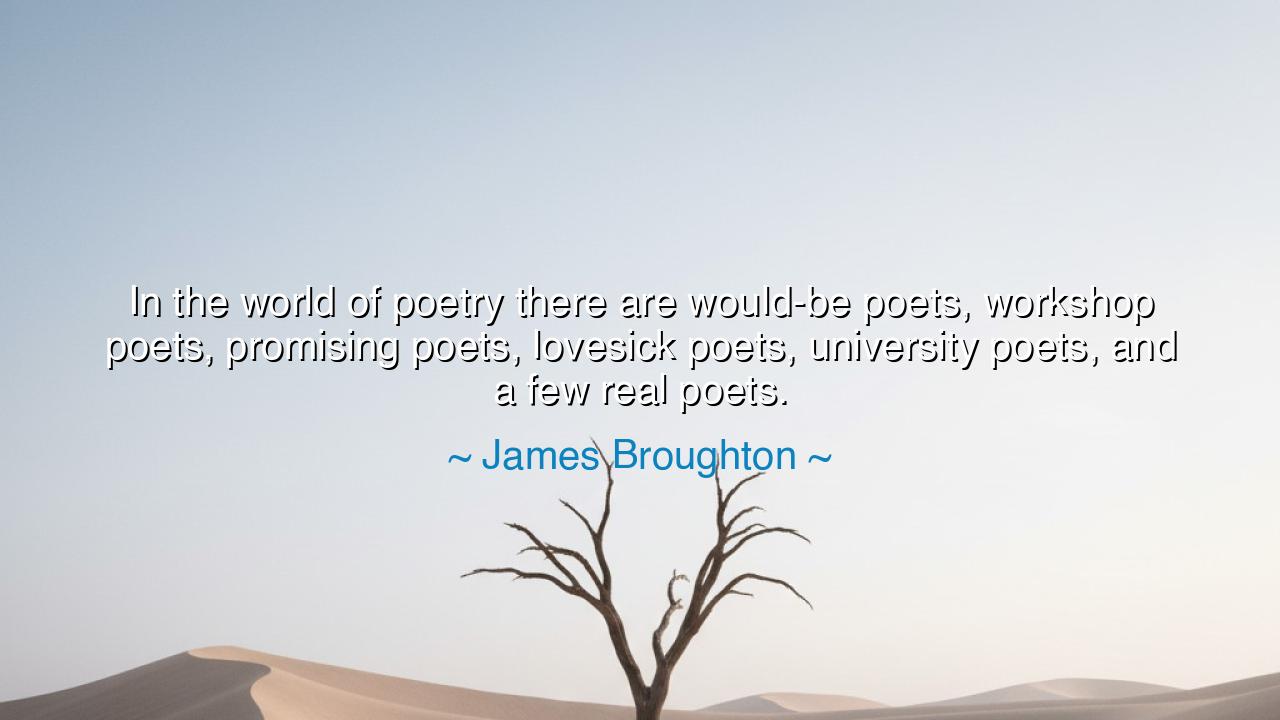
In the world of poetry there are would-be poets, workshop poets
In the world of poetry there are would-be poets, workshop poets, promising poets, lovesick poets, university poets, and a few real poets.






Hear the piercing words of James Broughton, poet of vision and daring, who declared: “In the world of poetry there are would-be poets, workshop poets, promising poets, lovesick poets, university poets, and a few real poets.” Within this statement lies a sober truth and a gentle warning: that the path of poetry is wide and crowded, filled with seekers of many kinds, but only a small number truly reach the essence, the living flame of what it means to be a real poet. His words are not meant to scorn but to remind us that poetry is more than imitation, more than ambition, more than performance. It is a calling that demands the whole soul.
The meaning of his divisions—would-be, workshop, promising, lovesick, university, real—is not to rank poets by pride, but to unveil the many masks that poetry wears. The would-be poet is one who dreams of the title without labor, desiring the crown without carrying the burden. The workshop poet may craft with technique, but too often writes for approval, for the nods of peers, not for truth. The promising poet has sparks but has not yet endured the discipline needed to transform promise into power. The lovesick poet writes from passion but may be blinded by narrow obsession, unable to see beyond their own heart. The university poet often thrives in analysis, yet risks burying the fire beneath layers of academic refinement. And then, beyond them all, stand the real poets—those who write not for recognition, but because they must, because their very life depends on giving voice to the mystery within them.
The ancients too knew this truth. In Greece, there were many singers, but only a few whose songs endured—Homer, whose verses carried the spirit of a people; Sappho, whose fragments still burn like embers. In China, dynasties preserved countless poems, yet only a few voices—like Li Bai or Du Fu—rose above the rest, their words infused not only with skill but with the weight of lived truth. What Broughton reminds us is what time itself has shown: that technique, passion, and ambition may fill the world with words, but real poetry carries the breath of eternity.
History gives us examples of this distinction. Consider Emily Dickinson. She lived in obscurity, unseen by literary societies or universities, yet her poems, written in solitude, carried the force of revelation. She was no workshop poet, no university poet—she was a real poet, compelled to write as if recording messages from beyond. Contrast her with the many voices of her age, who filled journals with well-made but forgettable verses. Their names are dust; hers is immortal. This is the distinction Broughton makes: many may write, but only a few ignite.
But let us not mistake his words as condemnation. For even the would-be poet or the promising poet may yet grow. The lovesick may learn to see the world beyond themselves; the university poet may rediscover the fire buried beneath intellect. All of these paths may lead, if pursued with honesty and passion, toward the realm of the real poet. Broughton’s teaching is not to dismiss, but to call forth—to urge us not to stop at promise or craft, but to press deeper, to risk everything, to write not only with the hand but with the soul.
The lesson for us is clear: do not be content with being a type of poet. Strive for authenticity. Ask yourself: do I write to impress, or do I write because my spirit demands it? Do I shape words merely as ornaments, or do I allow them to burn with truth? To be a real poet is not to achieve fame, but to surrender to the calling of poetry as spiritual practice, as vision, as necessity.
Practical wisdom flows from this. Read deeply, not only to learn form but to awaken your inner voice. Live fully, for poetry that is not rooted in life is hollow. Write with honesty, even if your words tremble. Resist the temptation to perform for applause or fashion, for these are fleeting. Instead, cultivate the courage to speak the truths that rise from your depths. If you do this, then whether or not the world calls you a poet, you will know that you have lived as one of the real poets.
Thus James Broughton’s words endure as both mirror and summons: the world of poetry is full of voices, but only a few are real. Let us strive to be among them—not through pride, but through humility, authenticity, and devotion to the fire of truth. For the real poet is not made by title, but by the willingness to carry the burden of vision, and to give it voice for the generations yet to come.






AAdministratorAdministrator
Welcome, honored guests. Please leave a comment, we will respond soon